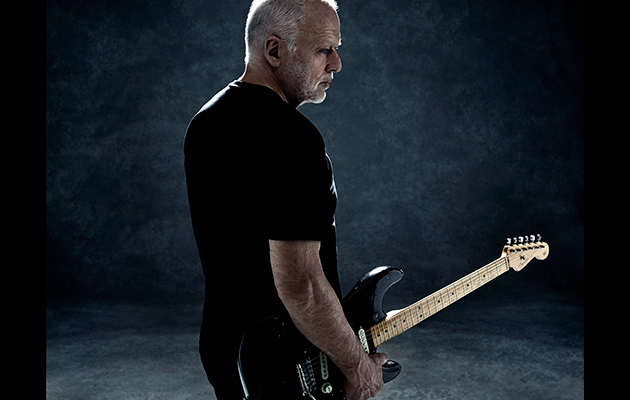Such personal revelations seem strangely out of keeping for Gilmour. Aubrey Powell – a friend of Gilmour’s since 1962 – describes Gilmour as “humble, slightly reserved, articulate, highly intelligent. He was like that in Cambridge and he’s like that now.” Po remembers his formative meetings with Gilmour, and his Pink Floyd bandmates. As a tantalizing glimpse into pre-Floyd history, Po reveals he recently found the “beating manual” for the Cambridgeshire High School for Boys: alma mater of Roger Waters, Syd Barrett and Storm Thorgerson. “It’s a record of all the boys that were ever beaten in the school and the cane that was used to beat them with. Roger’s in there for throwing water, Syd’s in there for being argumentative and Storm was in there for truancy. They all had six of the best. Because of everybody’s background, Pink Floyd had that post-war middle class English bravado about them. It gave them that edge. They were all bright and intelligent and all knew what was expected of them and knew how to get there and how to attain it. That comes with education and they were fortunate.”

Powell, meanwhile, has fond memories of the young Gilmour. “He was unbelievably good looking. It was great to be with because he would always attract a bevy of girls. But at the same time he had a slight shyness to him, which girls found even more endearing. But when he played guitar and sang he had confidence that was above anybody else’s in that Cambridge set. David was really good at learning to play songs – and instantly. I remember when ‘Hey Joe’ came out. I saw David a few days later and said, ‘Have you heard that amazing track “Hey Joe”?’ He said, ‘Yeah, it goes like this.’ He just played it.”
“When you start out, you copy,” says Gilmour. “Trying to be too original when you’re too young is possibly not the best thing. But I learned copying Pete Seeger, Lead Belly, Jeff Beck, Eric Clapton, Jimi Hendrix. All sorts of people.”
In December, 1967, David Gilmour joined Pink Floyd; essentially, as an additional guitarist to support the ailing Syd Barrett. “At that point, Roger had to take the leading role because otherwise Pink Floyd would collapse,” says Po. “Roger was always the strongest in Pink Floyd, but they relied on Syd for his writing skills. Roger hadn’t really written any songs up to that point. But because of David’s singing and guitar playing abilities, he thought he’d be able to write with him.
“The first song they wrote was ‘Point Me At The Sky’, which was not a success but nevertheless it was the start of them working together. When it came out, they asked Storm and I to make a film. We went to Biggin Hill and rented a couple of Tiger Moths. Everybody took turns to fly in them while we were shooting with a couple of old Bolexes and an Arriflex 16mm camera. It was all Biggles and jolly hockey sticks. That’s a very middle class, public schoolboys fun day out. Five Go Mad At Biggin Hill.”
“David was absolutely crucial next stage,” adds Robert Wyatt. “He contributed to something they had latently, from their background in architecture. David has a sense of form and pace, in a way that makes almost all other groups look a bit ramshackle. So there’s a breathing space in Floyd. It’s like you’re entering a place. He’s a terrific blues player, measured, making everything count. I can’t think of anybody else he could have done it with. Rick was important in creating an aurora borealis around the music – a shimmering atmosphere. Roger and Nick, as a rhythm section, were very clear about where the beat is and where it’s going and what the notes are. Instead of speed they go for strength, a solidity that’s the perfect environment for David. It worked very well as a band. Better than very well.”
“It was hard for David at first,” remembers Po. “He was being asked to emulate a psychedelic sound which wasn’t him at all. But when you look at Live At Pompeii and you see David with that Strat, smashing the stage with it and bashing it about and creating extraordinary sound, it’s amazing how in a few short years he picked up on that wild, free psychedelic sound Pink Floyd were known for.”



